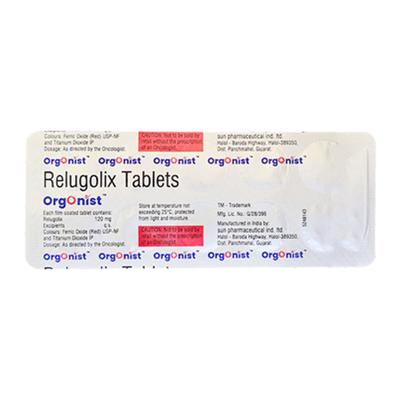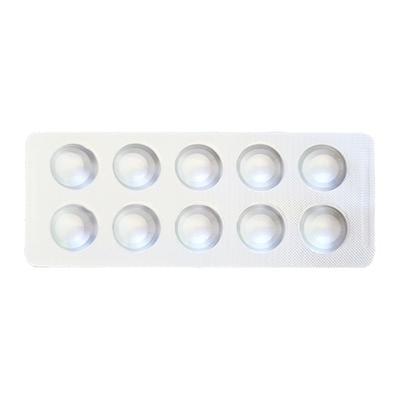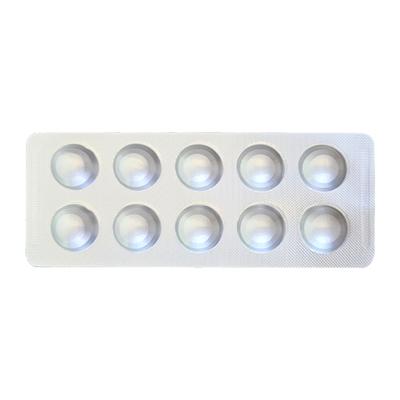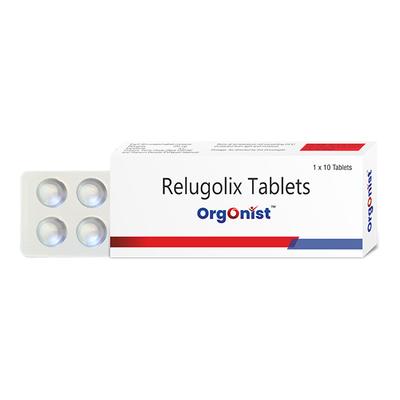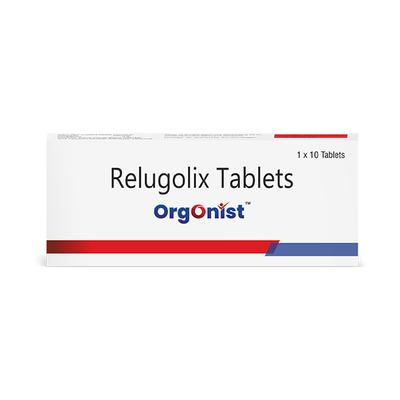

Netmeds First Membership
Quick Links
Introduction About ORGONIST TABLET
ORGONIST Tablet is a prescription medicine used in adults for the management of advanced prostate cancer. It contains a medicine called Relugolix which is a gonadotropin-releasing hormone (GnRH) receptor antagonist. It works by suppressing your body from producing excess testosterone (a male hormone) which result in prostate cancer growth and development.
Take ORGONIST Tablet as advised by your physician. It can be taken with or without food. Do not stop taking ORGONIST Tablet without consulting your doctor. Before taking ORGONIST Tablet inform your doctor if you have any liver, kidney or heart problems. You must also inform your doctor if you have osteoporosis or heart rhythm disorders as a precaution.
There is no proper information regarding the use of ORGONIST Tablet in pregnant and breastfeeding women. Therefore, consult your doctor for advice. ORGONIST Tablet may impair fertility in men. Therefore, talk to your doctor regarding semen storage. Men who have pregnant partners or partners with childbearing potential must use an effective contraceptive method to avoid pregnancy during therapy with ORGONIST Tablet and until 2 weeks after the last dose.
The most common side effects of taking ORGONIST Tablet are hot flushes, tiredness, constipation, diarrhea, weight gain, decreased sex drive, erectile dysfunction, increased blood sugar and fat levels, muscle and joint pain and low blood haemoglobin levels. Consult your doctor if they trouble you.
Uses Of ORGONIST TABLET
- Management of advanced prostate cancer in adults
How ORGONIST TABLET Works
ORGONIST Tablet contains a medicine called Relugolix which reduces the growth and division of prostate cancer cells. It works by blocking a step in the cell division process that signals the testes to produce testosterone. Since prostate cancer is caused due to abnormal and excess release of testosterone, this action of Relugolix prevents prostate cancer cells from growing and dividing.
How to use ORGONIST TABLET
Take ORGONIST Tablet as advised by your physician. Swallow the medicine with a glass of water. Do not crush or chew the medicine. ORGONIST Tablet can be taken with or without food.
Your doctor will decide the correct dose and duration of therapy for you based on your age, body weight, and health condition. Do not stop taking ORGONIST Tablet without consulting your doctor.
Side Effects Of ORGONIST TABLET
Common
- hot flushes
- tiredness, dizziness, headache
- constipation, diarrhea, stomach upset, nausea
- weight gain
- decreased sex drive, erectile dysfunction
- muscle and joint pain
- increased sweating
- breast enlargement in men (gynaecomastia)
- sleeplessness, depression
- increased blood sugar levels
- increased blood fat (triglyceride) levels
- low blood hemoglobin levels
- increased liver enzymes’
Stop taking ORGONIST TABLET and consult your doctor immediately if you experience any of the following side effects:
- changes in the electrical activity of your heart
- signs of QT prolongation (such as dizziness, fainting, palpitations, chest pain)
- signs of allergic reactions (such as severe skin rashes with itching, swelling of your face, lips, tongue, throat, trouble in breathing and swallowing)
How To Manage Side Effects
Tiredness
Managing tiredness caused by cancer medicines requires a multifaceted approach tailored to the individual's needs. Ensuring adequate rest and prioritizing quality sleep is crucial; this may involve creating a comfortable sleep environment and establishing a relaxing bedtime routine. Balancing rest with gentle physical activity, such as walking or yoga, can improve energy levels and overall well-being. Maintaining a nutritious diet rich in proteins, vitamins, and minerals supports the body’s energy needs, while staying hydrated is equally important. Additionally, managing stress through relaxation techniques like meditation or deep breathing exercises can alleviate fatigue. It's essential to communicate with healthcare providers about fatigue, as they may adjust medications or suggest interventions like physical therapy or counselling to help manage this side effect effectively.
Warning & Precautions
Pregnancy
Consult your doctorThere is a limited amount of information from the use of relugolix in pregnant women. Studies in animals have shown that exposure to relugolix in early pregnancy may increase the risk of early pregnancy loss. Therefore, inform your doctor before taking ORGONIST Tablet if you are pregnant or think you may be pregnant. Men who have pregnant partners or partners with childbearing potential must use an effective contraceptive method to avoid pregnancy during therapy with ORGONIST Tablet and until 2 weeks after the last dose.
Breastfeeding
Consult your doctorIt is not known if relugolix passes into your breast milk. Therefore, inform your doctor before taking ORGONIST Tablet if you are breastfeeding.
Driving and Using Machines
Use with CautionORGONIST Tablet may cause fatigue and dizziness. Therefore, do not drive or handle any heavy tools or machineries if your ability is affected by this medicine.
Kidney
Use with CautionORGONIST Tablet should be used with caution in patients with kidney problems. Therefore, consult your doctor for advice.
Liver
Use with CautionORGONIST Tablet should be used with caution in patients with liver problems. Therefore, consult your doctor for advice.
Allergy
ContraindicatedDo not take ORGONIST Tablet if you are allergic to Relugolix or any other ingredients of this medicine.
Heart Disease
Use with CautionORGONIST Tablet should be used with caution in patients with any heart problems (including long QT syndrome). Therefore, consult your doctor for advice.
Use In Pediatrics
ContraindicatedORGONIST Tablet is not suitable for use in children and adolescents aged below 18 years of age.
Use In Geriatrics
Use with CautionORGONIST Tablet should be used with caution in elderly patients. Therefore, consult your doctor for advice.
Others
Before taking ORGONIST Tablet inform your doctor if you have:
- osteoporosis (weak bones)
Interactions
A. Drug-Drug interactions:
- Anti-arrhythmic agents (such as quinidine, procainamide, amiodarone, sotalol, dronedarone, propafenone)
- Methadone (a pain killer)
- Moxifloxacin (an antibiotic)
- Antipsychotics
- Antiepileptic agents (such as carbamazepine, phenytoin, phenobarbital)
- Antibacterial agents (such as rifampicin, azithromycin, erythromycin, clarithromycin, gentamicin, tetracycline)
- Antifungal agents (such as ketoconazole, itraconazole)
- Anticancer agents (Ex. apalutamide)
- Herbal remedies containing St John’s Wort (Hypericum perforatum)
- Antihypertensive agents (such as carvedilol, verapamil)
- Anti-anginal agents (such as ranolazine)
- Immunosuppressants (such as cyclosporine)
- Anti-HIV agents (such as ritonavir and its combinations, efavirenz)
- Anti-viral agents for hepatitis C infections (such as telaprevir)
Overdosage:
If you or anyone else accidentally took too much of ORGONIST Tablet, consult your doctor immediately.
Synopsis
| Drug | : | Relugolix |
| Pharmacological Category | : | Gonadotropin-releasing hormone receptor antagonist |
| Therapeutic Indication | : | Prostate cancer |
| Dosage Forms | : | Tablet |
More Information
Prostate cancer is a type of cancer that develops in the prostate gland, which is part of the male reproductive system. The prostate is a small, walnut-sized gland located below the bladder and in front of the rectum, responsible for producing seminal fluid that nourishes and transports sperm.
Prostate cancer often grows slowly and may initially be confined to the prostate gland, where it may not cause serious harm. However, some types can be aggressive and spread quickly to other parts of the body, including the bones and lymph nodes. Symptoms can include difficulty urinating, blood in the urine, pelvic discomfort, and erectile dysfunction, although early stages may not present noticeable symptoms. Regular screening and early detection through methods like PSA (prostate-specific antigen) tests and digital rectal exams are crucial for effective management.
FAQs About ORGONIST TABLET
Q: What is ORGONIST Tablet used for?
A: ORGONIST Tablet is a prescription medicine used in adults for the management of advanced prostate cancer.
Q: How ORGONIST Tablet works?
A: ORGONIST Tablet contains a medicine called Relugolix which is a gonadotropin-releasing hormone (GnRH) receptor antagonist. It works by suppressing your body from producing excess testosterone (a male hormone) which result in prostate cancer growth and development.
Q: How to take ORGONIST Tablet?
A: Take ORGONIST Tablet as advised by your physician. Swallow the medicine with a glass of water. Do not crush or chew the medicine. ORGONIST Tablet can be taken with or without food. Do not stop taking ORGONIST Tablet without consulting your doctor.
Q: Can the use of ORGONIST Tablet affect fertility?
A: Yes. Studies have shown that ORGONIST Tablet affects male fertility. It may also cause erectile dysfunction and decreased sex drive. Therefore, consult your doctor regarding semen storage.
Q: Is ORGONIST Tablet safe?
A: ORGONIST Tablet is safe when used under medical supervision. Your doctor can provide personalized advice, considering your medical history, current medications, and any underlying health issues. Always follow the prescribed dosage and report any side effects or adverse reactions to your healthcare provider promptly. Avoid self-medicating and rely on professional medical advice for the safe use of ORGONIST Tablets.
Q: What are the common side effects of taking ORGONIST Tablet?
A: The most common side effects of taking ORGONIST Tablet are hot flushes, tiredness, constipation, diarrhea, weight gain, decreased sex drive, erectile dysfunction, increased blood sugar and fat levels, muscle and joint pain and low blood haemoglobin levels. Consult your doctor if they trouble you.
Q: What cautions must be followed while taking ORGONIST Tablet?
A: Take ORGONIST Tablet as advised by your physician. It can be taken with or without food. Do not stop taking ORGONIST Tablet without consulting your doctor. Before taking ORGONIST Tablet inform your doctor if you have any liver, kidney or heart problems. You must also inform your doctor if you have osteoporosis or heart rhythm disorders as a precaution. There is no proper information regarding the use of ORGONIST Tablet in pregnant and breastfeeding women. Therefore, consult your doctor for advice. ORGONIST Tablet may impair fertility in men. Therefore, talk to your doctor regarding semen storage. Men who have pregnant partners or partners with childbearing potential must use an effective contraceptive method to avoid pregnancy during therapy with ORGONIST Tablet and until 2 weeks after the last dose.
Q: Can ORGONIST Tablet be used in elderly patients?
A: ORGONIST Tablet should be used with caution in elderly patients. Therefore, consult your doctor for advice.
Q: What parameters must be monitored while using ORGONIST Tablet?
A: During therapy with ORGONIST Tablet your doctor will recommend you take Prostate Specific Antigen - Psa (Total) and Prostate Specific Antigen - Psa (Free) to analyse the efficacy of this medicine.
References
1. ORGOVYX. relugolix tablet. Sumitomo Pharma America, Inc. [Revised in August 2023]. [Accessed on 4th June 2024] https://www.orgovyx.com/content/pdfs/orgovyx-patient-information.pdf
2. Orgovyx 120 mg film-coated tablet. EMA. Europa.eu. Summary of Product Characteristics. [Revised in April 2022]. [Accessed on 4th June 2024] https://www.ema.europa.eu/en/documents/product-information/orgovyx-epar-product-information_en.pdf
3. Relugolix: a novel androgen deprivation therapy for management of patients with advanced prostate cancer. NIH. National Library of Medicine. National Center for Biotechnology Information. March 2021. [Accessed on 4th June 2024] https://www.ncbi.nlm.nih.gov/pmc/articles/PMC8366106/
Useful Diagnostic Tests
- Prostate Specific Antigen-Psa (Total)
- Prostate Specific Antigen-Psa (Free)
- Healthians Prostate Cancer Package











